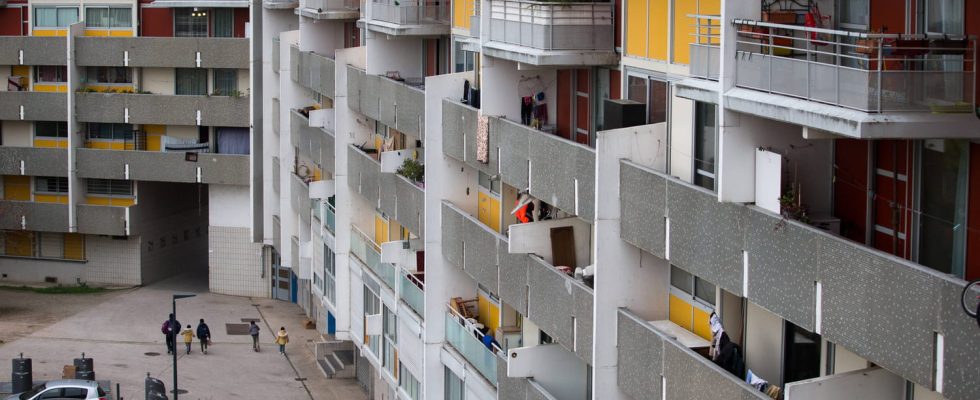The bill “relating to the development of the supply of affordable housing” unveiled by the Minister of Housing, Guillaume Kasbarian, triggered an outcry among tenant associations. The government is notably accused of giving a “gift to mayors who do not want social housing”.
The Minister of Housing, Guillaume Kasbarian, unveils his bill “relating to the development of the supply of affordable housing” in the Council of Ministers this Friday, May 3, 2024. It aims in particular to provide the first responses to the serious crisis facing the sector with an in-depth reform of social housing. This project also aims to better house the middle class. However, the main HLM tenants’ associations quickly castigated “a bill which preys on the poor”.
What does this contested bill contain?
The bill is based on several pillars. First, the payment of an additional rent “from the first euro of exceeding the resource ceiling” announces Guillaume Kasbarian. Until now, a social housing tenant paid an additional rent when their resources exceeded the 20% ceiling. Then, the pure and simple termination of the housing lease within eighteen months if the resource ceiling is “exceeded by 20% for two years in a row”.
In addition, the assets of tenants will now be taken into account when granting or maintaining social housing. “You can be a tenant of social housing by having inherited one or more second homes and go under the radar” explains the minister. Also, the weight of mayors will be strengthened. They will be able to “chair the commissions for the allocation of social housing and prioritize the residents who enter it”. Guillaume Kasbarian, on the other hand, refuses any risk of clientelism. Finally, intermediate housing could be integrated into the SRU law “to diversify the offer and support the middle class who have difficulty finding housing”. These intermediate housing units are intended for low-income people, but not eligible for social housing. Until then, they could not be included in the SRU law.
“Electoral clientelism”, even “national preference”
This Friday, the Director of Studies at the Abbé Pierre Foundation, Manuel Domergue, expressed his amazement and his opposition to the government’s project on RMC. First on the subject of the additional powers granted to mayors: “He will say to mayors who do not want to do social housing “it doesn’t matter! You do intermediate housing, which is basically executive housing, and you will have satisfied your obligations.” […] It’s a gift for mayors who don’t want social housing.”
For the National Housing Council (CNH), bringing together the many players in the world of housing (professional associations, social landlords, elected officials, tenant associations), the mayors’ right to review the allocation of new HLMs could lead to a certain “electoral clientelism (…) or even (of) national preference”. The 5 main HLM tenant associations even denounce “a project which hunts down the poor”. An expression taken up by Manuel Domergue, this morning at the microphone of RMC, who regrets “several very negative aspects” of this bill.
The text “allows rents for social housing to be increased for the very poor”
In a communicated, published on the Consumption Housing Framework of Life (CLCV) website, tenant associations are also opposed to a “pretext” measure according to them, that of paying the extra rent from the first euro excess: “Under the pretext of promoting mobility in social housing, he (the Minister of Housing, editor’s note) proposes to evict more tenants exceeding the resource ceilings in force and to demand an additional rent from the first euro in excess. The Minister of Housing threatens more than 8. % of HLM tenants, very far from being rich, for a very minority phenomenon (less than 8,000 households out of nearly 5 million), knowing knowingly that the law already allows the termination of the lease for tenants well beyond the ceilings of resources 35% of HLM tenants already live below the poverty line and 1 in 4 tenants have found themselves in arrears over the last 12 months” we can read. “It’s a decoy, it’s a backlash,” says the Director of Studies at the Abbé Pierre Foundation.
For him, the text “makes it possible to increase the rents of social housing for the very poor. Fortunately we have these social housing units, which are not always in great condition, but which make it possible to house people who are on RSA, at Minimum wage. […] Today, social housing is often too expensive and the government plans to increase rents for what remains of cheap social housing,” he regrets. So, if tenants who do not respect the resource ceiling came to be expelled, where would they go? This is what the general delegate of the Abbé Pierre Foundation, Christophe Robert, asks, comments relayed by AFP: “To go where? These are still small resources for a household. And the steps between social housing and private housing, in certain areas, they are very, very high!” he explains.
“The minister rewards outlaw mayors”
Another problem highlighted by Christophe Robert is the announced relaxation of the SRU law, which imposes social housing quotas on cities. Guillaume Kasbarian and the government want municipalities that do not meet the objectives to be able to integrate intermediate housing, intended for the middle classes, into part of their production in order to catch up. “The minister also rewards the outlaw mayors who for 20 years have not respected the SRU law and the obligation to have 25% social housing in the most tense areas. By integrating intermediate housing into the calculation of social housing, largely unaffordable for the more than 2.6 million current applicants (less than 3% are eligible), we will not be able to accommodate those who are waiting for housing” criticizes the CNH in its press release. Tenant associations are proposing to penalize mayors who refuse to “house tenants in decent and affordable conditions”.
